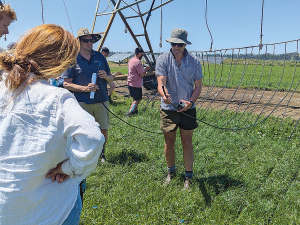Genetics, Efficiency and Performance: How the Burgesses are raising the bar at Te Poi
Bill and Michelle Burgess had an eye-opening realisation when they produced the same with fewer cows.
 Cameron Henderson explains features of the drip-tube irrigation system he is trialling, to attendees at a field day on his North Canterbury farm.
Cameron Henderson explains features of the drip-tube irrigation system he is trialling, to attendees at a field day on his North Canterbury farm.
North Canterbury dairy farmer and recently elected deputy chair of DairyNZ, Cameron Henderson is not afraid to break the mould when it comes to finding farming systems that work for him.
In a region where fodder beet or kale wintering, often off-farm, is very much the norm in dairying, Henderson has reverted to all-pasture wintering - and uncovered several benefits.
In another mark of his willingness to innovate he is also trialling a soil oxygenation system. While the jury is still out on that, it has already shown a huge side benefit in irrigation efficiency.
Henderson recently hosted a field day on his farm near Oxford, which he converted from sheep in 2011.
The property is 237ha, 220ha effective, and peak milking about 750 crossbred cows. A nearby 200ha is used for rearing young stock and growing gain and grass silage for the platform.
Irrigation is from six wells via three pivots, K-lines and laterals.
Henderson told the field day he had become increasingly dissatisfied with wintering on kale and fodder beet on the 200ha block, with constant difficulties with crop management and animal health.
Especially in wetter winters, the crops ruined the soil and it was costing more and more to get the needed yields.
"Anyone that's growing their own fodder beet on the platform, you know what the soil looks like after a fodder beet crop, it's pretty devastated."
But he said the "nail in the coffin" for fodder beet wintering was the rumination data provided by the collars which the cows have now worn for the last two years. Even though they were "not killing any cows", the collars gave evidence of minor acidosis events that would otherwise go unnoticed in cow behaviour.
Cumulatively they were seeing lower calf rates and higher abortion rates throughout the winter.
He therefore took the opportunity of leasing an adjoining 110ha dryland pasture block which has now been used for one full winter.
Henderson said it was old sheep pasture that hadn't been renewed in decades. They simply added a little nitrogen then cut the grass in November, leaving the plastic-wrapped bales where they fell and allowing the grass to continue growing around them.
"And we don't touch them til winter. So it will just grow whatever it grows, then the cows go in.
"We're still trialling a number of different ways of how to feed it. But we landed at the end of last winter, on 3-day breaks. We just go in on day one and whip all the plastic off the bales.
"On day one, the cows all the baled silage then the next two days they're just eating the grass around it."
Henderson said it was cost-competitive with fodderbeet and the dry pasture meant the cows were "happy as" even on the wettest days.
"Results were positive overall, with very low labour requirement, zero machinery use, no mud and satisfied cows, and collar data showed rumination time far more consistent than when grazed on crop.
"Overseer modelling on the pasture wintering calculated nitrogen loss between 15-19 kgN/ha. Compered to 90 kgN/ha on fodder beet and 50 kgN/ha on kale."
Other positives were no need for feed transition at either end of the winter, and that cows could successfully calve on the winter block.
Cons included high stock water need due to the high DM percentage and a reduced surety of pasture yield due to the blod being dryland.
Henderson said they had learned a lot from the first season. They had used machinery to move some bales around but this year they would aim not to put a tractor on the block at all except for the baling. They were also trying different methods of cutting the bales, such as leaving the bottom half of plastic on, to reduce wastage.
"But yeah, we're really happy with year one."
New Zealand's new Special Agricultural Trade Envoy, Horowhenua dairy farmer, company director and former Minister of Agriculture, Nathan Guy says the Free Trade Agreement (FTA) with India is a good deal for the country.
New figures show dairy farmers are not only holding on to their international workforce, but are also supporting those staff to step into higher-skilled roles on farm.
New tractor deliveries for 2025 jumped 10% compared to the previous year, a reflection of the positive primary sector outlook, according to the Tractor and Machinery Association (TAMA).
Entries have opened for two awards in the New Zealand Dairy Industry Awards (NZDIA) programme, aimed at helping young farmers progress to farm ownership.
Federated Farmers has confirmed interim chief executive Mike Siermans to the role.
Registrations are now open for the 2026 Ruralco Golf Classic, with all proceeds from the event set to support the Mid Canterbury Rural Support Trust.
OPINION: When it comes to New Zealand's foreign relations, Foreign Minister Winston Peters likes to make all the big calls;…
OPINION: Another example of the dairy sector getting shortchanged in free trade deals?